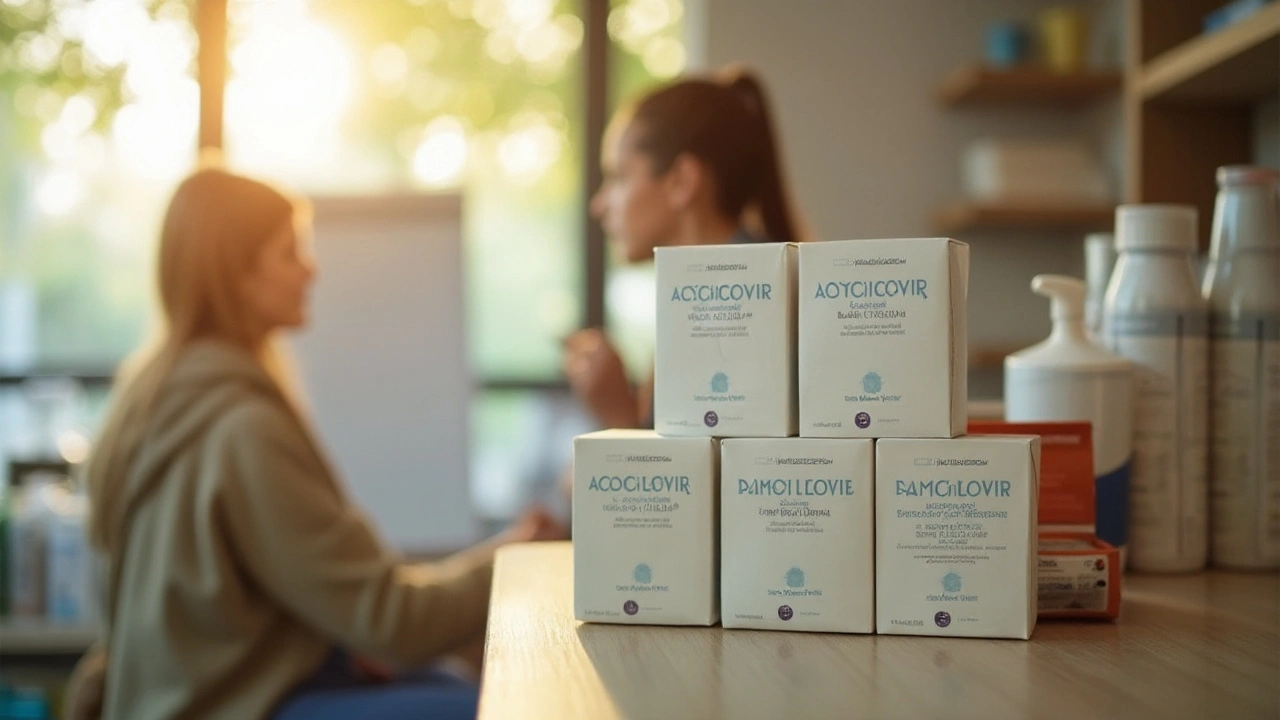In the world of antiviral medications, finding effective treatment options for herpes can be a crucial decision. While Valtrex is widely known, there are several other possibilities available in 2024 that deserve attention. Each of these alternatives offers its unique benefits and potential drawbacks, tailored to suit different needs and conditions.
This article will delve into six possible substitutes for Valtrex, detailing their specific uses, advantages, and limitations. With choices ranging from oral medications to topical treatments, understanding these options can empower individuals with herpes to make informed decisions about their health.
- Acyclovir (Zovirax)
- Famciclovir (Famvir)
- Penciclovir
- Docosanol (Abreva)
- Idoxuridine
- Trifluridine
- Conclusion and Comparison Table
Acyclovir (Zovirax)
Acyclovir, known by its brand name Zovirax, stands as a stalwart in the treatment of herpes-related infections. Originally introduced in the 1970s, it has since become a cornerstone in managing conditions caused by herpes viruses. It's often favored for its broad-spectrum effectiveness, as it targets a variety of herpes strains, including herpes simplex type 1 and 2 (HSV-1 and HSV-2), as well as varicella-zoster virus, which leads to shingles. By halting the virus from multiplying, Acyclovir aids the body's immune system in controlling infection and reducing symptoms. Despite its longstanding presence in the medical sphere, it still garners trust from both healthcare providers and patients alike.
One of the compelling features of Acyclovir lies in its diverse formulations—oral tablets, creams for topical application, and intravenous forms for more severe cases. The availability of these various forms makes it adaptable for different cases, ranging from a minor cold sore outbreak to more serious systemic infections. However, it’s crucial to note the requirement for more frequent dosing in comparison to its sibling drug, Valtrex. This is due to Acyclovir’s lower oral bioavailability, meaning that less of the medicine is available for use in the body when taken orally. This frequent dosing can sometimes be a barrier for patient compliance, especially among those who may struggle with strict medication schedules.
Effective herpes medication like Acyclovir remains fundamental in the management and control of herpes infections, with its long history supporting its reliability. Yet, it’s not without its competitors. In recent years, discussions have emerged about whether the frequency of its dosage is a fair trade-off against its benefits. Despite this, many healthcare providers still recommend it as a viable alternative to Valtrex, especially when other options might not be suitable or available. As a healthcare professional once noted,
"Acyclovir offers a time-tested and effective approach to herpes management that continues to hold its ground amidst newer antivirals."
The balance of efficacy and tolerability marks Acyclovir as a staple in antiviral treatments, especially for those who need a choice beyond Valtrex alternatives. Although newer medications, like Famciclovir, present with better bioavailability, Acyclovir's affordability and accessibility keep it in the running. Its extensive history provides medical professionals a wealth of data concerning its short and long-term effects, ensuring that their patients are receiving a treatment that has been proven effective repeatedly across numerous populations. Acyclovir’s endurance in the medical community is a testament to its value, offering a robust and accessible solution to the pervasive problem of herpes infections.
Famciclovir (Famvir)
Famciclovir, marketed under the name Famvir, is an intriguing option in the realm of antiviral medications, particularly aimed at tackling herpes-related infections. This drug acts as a prodrug, meaning it transforms within the body into its active form, penciclovir, which is adept at inhibiting the replication of viral DNA. Its oral bioavailability is better than that of penciclovir directly, making it a more practical choice for systemic treatment as it can be consumed in pill form. Famciclovir is primarily recognized for its effectiveness in treating shingles, also known as herpes zoster, which is a reactivation of the varicella-zoster virus that causes chickenpox.
It's also worth noting how Famciclovir finds its utility in managing cases of oral and genital herpes, offering a relief pathway for individuals, especially those with impaired immune systems. This aspect makes Famciclovir a preferred choice for patients who might not respond as effectively to other medications due to their immune status. The practicality of the drug is further enhanced by its administration method, typically involving less frequent doses compared to other drugs like Acyclovir, which require more diligence in dosage timings. This ease of use can significantly improve compliance among patients who struggle with maintaining a strict medication schedule.
Pros
- Efficient for shingles treatment
- Improved bioavailability over penciclovir
- Suitable for immune-compromised individuals
Cons
- Primarily used for shingles
- Less common for HSV-1 and HSV-2
Dr. Susan Miller from the University of Toronto remarked in a 2023 publication, "Famciclovir provides an excellent alternative for managing herpes zoster infections, offering both efficacy and convenience in dosing that benefits patient adherence."
Despite its focus on shingles, Famciclovir’s versatility cannot be overstated, as it serves as a viable backup when Valacyclovir or Aciclovir is not the ideal fit for a patient. This flexibility underscores its role in a well-rounded treatment strategy against various herpes virus manifestations. Its introduction to the market has marked a significant step forward in expanding treatment options, enabling healthcare providers to tailor their approach to patient care more specifically.

Penciclovir
When it comes to tackling cold sores with precision, Penciclovir stands as a trusted ally in the realm of antiviral medications. Specifically formulated for topical use, this medication is lauded for its capacity to mitigate the aggravation and persistence of cold sores caused by the herpes simplex virus. Marketed under the brand name Denavir, Penciclovir has cemented its reputation with a solid track record in efficacy and safety. Through its targeted application, it works to impede the viral replication within infected cells, thereby shortening the episode of an outbreak.
One of the defining aspects of Penciclovir is its ability to fight off cold sores while being easy on the system. Unlike systemic treatments which affect the entire body, Penciclovir’s topical approach zeroes in on active lesions. While this localized focus is highly effective for cold sores, its role is limited by its poor oral bioavailability, meaning it isn't absorbed into the bloodstream effectively enough for systemic viral infections. This characteristic restricts its use primarily to the surface-level indications it's famed for.
Penciclovir is praised for its efficacy in reducing the duration of cold sore episodes. According to a study in the Journal of Clinical Pharmacology, Penciclovir cream applied every 2 hours while awake showed a significant reduction in healing time compared to a placebo.
Users of Penciclovir often observe faster healing times and reduced pain compared to untreated sores. The cream is conveniently applied at the most vulnerable times, generally at the first sign of a cold sore outbreak. This prompt action can prevent the virus from spreading further, thereby lessening the overall impact of an outbreak. It is registered as a safe and generally well-tolerated medication, making it a considered choice for many faced with recurrent cold sores.
Yet, it’s important to manage expectations. While Penciclovir effectively shortens the lifespan of cold sores, it doesn’t eradicate the virus from the body. Herpes simplex is a recurring virus, capable of remaining dormant until future outbreaks arise, thus requiring repeated use of treatment like Penciclovir. As it is specifically used for cold sores, individuals dealing with other forms of herpes, like genital herpes or shingles, require alternative treatments that address systemic viral activity.
In the competitive space of antiviral treatments, Penciclovir maintains a specialized niche, primarily due to its specific targeting of oral herpes. Though not suitable for all manifestations of herpes infections, its focused application ensures that it remains a reliable option where applicable. The cream is generally applied every two hours during waking hours for four days, significantly impacting viral activity and fostering quicker recovery in affected individuals.
As you weigh your options beyond Valtrex and its expansive systemic reach, Penciclovir offers an effective, streamlined defense against cold sores. If a reliable and straightforward approach to treating these blistering outbreaks is what you need, then Penciclovir might just serve your needs well. Nonetheless, consulting with a healthcare provider can further inform and personalize your treatment plan, ensuring the best possible outcome with the resources available.
Docosanol (Abreva)
Docosanol, known by the brand name Abreva, is a herpes medication most recognized for its over-the-counter availability and ease of use. Designed as a topical cream, it caters specifically to those dealing with cold sores, which can be an unwelcome nuisance for many. Cold sores are primarily caused by the HSV-1 virus and can appear at the most inopportune times, often linked to stress or a weakened immune system. In a world moving at a fast pace, having a remedy that is conveniently accessible without needing a prescription can certainly be a relief. Applying Docosanol is straightforward, effectively blocking the virus from attaching and entering into healthy cells, this action can hasten the healing process and reduce the size of the lesion. This cream is best applied at the first sign of a tingle or outbreak, usually on the lip or around the mouth area.
The popularity of Abreva as an antiviral drug stems not just from its easy availability, but also from its direct approach to tackling the onset of symptoms. The instructions for use are quite simple: apply it consistently five times a day until the healing is noticeable, generally speeding up the recovery process. Many swear by the efficacy of this small yet mighty tube, noting a visible difference when used promptly. While Docosanol is less potent compared to prescription antivirals in battling systemic herpes infections, it serves as a valuable tool in the arsenal for managing the frustrating external symptoms of the virus.
Cold sores not only cause discomfort but can also impact one's confidence, often appearing during stress or when least expected. The fact that Docosanol can be purchased without a doctor's visit makes it an appreciated solution for those repetitively dealing with this condition. It's also worth noting that while it may not be as instant as some would prefer, the use of Docosanol encourages patients to address cold sores at their earliest stage, allowing the medication to take effect. A key point emphasized by dermatologists is to use the cream generously at the outset, as timely application is linked to improved outcomes.
Antiviral medications like Docosanol have undergone various studies to understand their effectiveness better. In the case of cold sore treatment, a significant number of users have reported shorter durations of outbreaks and reduced symptom severity. For individuals leaning toward over-the-counter solutions, Docosanol remains a practical choice. As it's not as aggressive as other prescription options, its tolerability is appreciated by those who experience side effects with stronger meds. While the usage is generally safe, always follow the instructions and watch for any irregular reactions.
Dr. Annabelle Fisher, a dermatologist, once noted, "For patients seeking immediate relief from cold sores, an accessible option like Docosanol is profoundly valuable, especially given its mechanism which directly blocks viral fusion." This insight from a well-respected figure in dermatology underscores the importance and effectiveness of having accessible treatments for common ailments.

Idoxuridine
Idoxuridine, one of the pioneering antiviral medications, has a unique position in the realm of herpes treatments. Historically significant, it was the first antiviral to be used for treating herpes simplex keratitis, an eye infection caused by HSV. It's fascinating to note that before the advent of more modern antivirals, idoxuridine played a crucial role in managing eye-related herpes conditions. While it's not as commonly used today, understanding its role helps highlight the progress made in medical sciences.
An essential aspect of idoxuridine is its mechanism of action. This drug works by incorporating into viral DNA, disrupting its replication process. This interference is particularly useful in treating eye infections where direct application is feasible. However, the systemic use of idoxuridine is limited because of advances in more effective and safer antiviral options like *Valtrex* and *Acyclovir*. One might wonder about its safety profile, especially considering its historical importance. Compared to its successors, idoxuridine can cause more local adverse effects, limiting its use primarily to ophthalmic solutions.
That said, it’s important to arouse attention not just to its constraints but its therapeutic contributions over the decades. In a historical context, idoxuridine’s introduction marked a turning point in antiviral pharmacotherapy, opening doors to understanding viral mechanisms and treatment strategies. It's incredible to think about the strides in antiviral treatments where idoxuridine once was the cutting-edge solution. It’s mentioned in "Principles of Antiviral Therapy" that "idoxuridine was groundbreaking, offering the first real hope against the debilitating effects of viral infections" (New England Journal of Medicine).
Though usage of idoxuridine has dwindled in the face of new-generation antivirals, its impact should not be underestimated. For those interested in medical history or the development of antiviral therapies, idoxuridine stands as a testament to early innovation. It reflects a time when prescription choices were limited, and this drug provided significant relief for severe conditions like herpes keratitis. The advances since then have dramatically expanded the antiviral arsenal at our disposal, illustrating the ongoing evolution in medical therapies for viral infections.
Trifluridine
Trifluridine stands as a distinctive choice when it comes to treating specific herpes infections, notably herpes simplex keratitis. This antiviral medication is used primarily as an eye drop to combat the infection of the eye caused by the herpes simplex virus. Unlike some other alternatives targeting systemic infections, Trifluridine is laser-focused on alleviating the discomfort and potential damage caused by viral infections of the eye.
One of the highlights of using Trifluridine in medical practice is its mode of administration and effectiveness in halting the replication of the virus. This precise action helps in reducing the longevity and severity of the infection. The timing of its application is crucial; starting treatment at the onset of symptoms can make a significant difference in recovery. Trifluridine is generally well-tolerated by patients, making it an appealing option for those struggling with ophthalmic herpes infections. Today, Trifluridine remains significant due to its targeted approach, allowing doctors to confidently address issues of viral replication within the delicate tissues of the eye.
Considering its specificity to eye infections, Trifluridine is not typically prescribed for systemic herpes infections. This is a critical point to remember for those exploring antiviral treatment options. It's essential to consult with an ophthalmologist or healthcare provider to discern whether this medication aligns with your unique needs. During prescription, the doctor will provide detailed instructions on how to correctly administer the drops, underscoring the importance of adhering to usage guidelines to maximize therapeutic outcomes.
Effectiveness and Application
It is worth noting that, while Trifluridine's application is limited to the eyes, its success in this area is profound. Patients are often advised to apply the medication every two hours while awake, up to nine times a day, as recommended by their healthcare practitioner. This routine helps ensure that the medication stays effective during the course of treatment. Since Trifluridine is a potent medication, doctors usually monitor the progress closely to avoid any potential adverse effects, ensuring the cornea's health is preserved during the healing process.
Valtrex alternatives like Trifluridine highlight how varied and specialized viral treatments can be, each crafted to meet specific medical challenges. This tailored approach not only provides targeted relief but also nurtures hope among patients who might feel limited by the side effects or efficacy rates of systemic medications. For those experiencing herpes infections of the eye, the introduction of Trifluridine into treatment plans represents a dedicated stride towards clarity and comfort.

Conclusion and Comparison Table
When it comes to managing herpes infections, knowing your options can make all the difference. Valtrex might be a go-to choice, but as we've explored, there are several strong contenders that may offer similar efficacy with different dosing schedules, side effect profiles, or costs. Each of the alternatives we've discussed has unique features that cater to distinct user needs. Whether you're looking for an over-the-counter cream like Docosanol or an antivirally potent oral medication such as Acyclovir, your choice depends on several factors including the type of herpes infection and personal health concerns. While some options are ideal for systemic infections, others shine when applied topically for localized treatment.
It is worth mentioning, as noted by the experts in pharmacology, antiviral medications work best when administered at the early stages of infection. This raises the importance of timely intervention and consultation with healthcare professionals who can tailor a treatment plan fitting individual conditions. In the vast sea of medications, it's crucial for patients to dwell in informed waters, understanding both the efficacy and limits of each drug.
"The right medication can significantly improve quality of life, managing herpes outbreaks with increased efficacy," says Dr. Kline, a well-respected virologist.Taking control of one's health requires a proactive approach to learning about available treatment options, considering not just the medical aspect but lifestyle choices and long-term management of the condition.
For a clearer snapshot of how these alternatives fare against each other, consult the comparison table below. This table highlights some of the key differences and similarities across different antiviral medications, aiding in simplifying the potentially overwhelming decision of selecting the right drug. Understanding these differences will empower you to make a careful choice that harmonizes with your specific requirements and lifestyle habits.
| Medication | Form | Primary Use | Pros | Cons |
|---|---|---|---|---|
| Acyclovir (Zovirax) | Oral, Topical, IV | HSV-1, HSV-2, Shingles | Wide range, Well-tolerated | Frequent dosing |
| Famciclovir (Famvir) | Oral | Shingles, HSV-1, HSV-2 | Better bioavailability | Less common for HSV |
| Penciclovir | Topical | Cold sores | Quick action | Limited to topicals |
| Docosanol (Abreva) | Topical | Cold sores | OTC availability | Not systemic |
| Idoxuridine | Topical | Eye infections | Historic effectiveness | Outdated |
| Trifluridine | Eye drops | Eye infections | Well-tolerated | Limited use |


Erik Redli
October 29, 2024
Everyone pats Valtrex on the back like it’s the cure‑all, but the data show that the newer agents actually outperform it in many real‑world studies. Acyclovir’s cheap price hides the fact that patients end up missing doses because of the three‑times‑daily schedule. If you care about adherence, you should be looking at Famciclovir or even the OTC option that blocks viral entry.
Jennyfer Collin
October 30, 2024
It is worth noting that pharmaceutical lobbying has influenced the prominence of Valtrex in clinical guidelines, often marginalising older but equally effective agents. While the mechanisms described are scientifically sound, one cannot ignore the subtle pressure exerted on prescribers to favour patented formulations. Consequently, a thorough review of independent trial data remains essential for an unbiased therapeutic decision.
Tim Waghorn
October 30, 2024
The pharmacokinetic profile of Acyclovir is characterised by an oral bioavailability of approximately 15‑20 %, necessitating dosing three to five times per day to maintain therapeutic plasma concentrations. In contrast, Famciclovir exhibits a bioavailability near 77 %, allowing for twice‑daily administration. This distinction can significantly affect patient compliance, particularly in chronic management of genital herpes.
Brady Johnson
October 31, 2024
When you scroll through the endless list of antiviral options, the first thing that strikes me is the sheer amount of marketing hype that surrounds Valtrex. The drug’s blockbuster status has turned it into a safety blanket for clinicians who prefer not to venture into the murkier waters of older generics. Take Acyclovir, for instance: it is a molecule that has been on the market since the 1970s, yet it still manages to hold its own against modern competitors. Its low oral bioavailability forces patients onto a three‑times‑daily schedule, a fact that many prescribers gloss over as a minor inconvenience. What is frequently omitted from the conversation is that adherence drops dramatically when patients are required to remember more than two doses a day. Famciclovir, on the other hand, offers a much more forgiving regimen, with only twice‑daily dosing needed to achieve comparable antiviral activity. The clinical trials that compare Famciclovir to Valtrex consistently demonstrate non‑inferior, and in some sub‑populations superior, outcomes for lesion healing time. Moreover, the side‑effect profile of Famciclovir is remarkably benign, with headache and nausea reported at rates below 5 % in most studies. Contrast that with Valtrex, where headache incidence can climb above 10 % and occasional renal impairment has been documented in high‑risk groups. The over‑reliance on Valtrex also masks the fact that topical agents such as Penciclovir and Docosanol can provide rapid symptom relief for recurrent oral lesions without systemic exposure. Patients who are prone to kidney issues or who are on polypharmacy regimens would do well to explore these options before committing to a lifelong oral antiviral. Even the historically significant Idoxuridine and Trifluridine have niche but valuable roles in ophthalmic herpes, a reminder that one size does not fit all. The medical literature is replete with head‑to‑head comparisons, yet the prescribing habits remain stubbornly anchored to brand‑name Valtrex. One could argue that the inertia is driven by pharmaceutical incentives rather than patient‑centred outcomes. In practice, a nuanced, case‑by‑case assessment that weighs dosing convenience, side‑effects, cost, and the specific herpes manifestation will always outperform a blanket recommendation. Therefore, before you accept Valtrex as the default, take a moment to match the virus’s behavior with the drug’s pharmacodynamics – the answer may well lie in a different pill, cream, or eye drop.
Jay Campbell
October 31, 2024
Your points about adherence are spot on; simplifying the regimen can make a huge difference for patients.
Laura Hibbard
November 1, 2024
Wow, a comparison table that looks like it was copied from a high‑school science project-so helpful, truly. I see you’ve crammed all the data into a single table, because apparently we all love scrolling through endless rows of pills. If I wanted a spreadsheet I’d open Excel. Still, credit where it’s due: the summary of pros and cons does give a quick glance for the indecisive.
Rachel Zack
November 1, 2024
Honestly, mocking the effort is just plain rude-people spent real time gathering these facts. We should appreciate the attempt to educate, not tear it apart. If anyone cares about public health, they’ll read the table carefully.
Lori Brown
November 2, 2024
Hope this helps someone find the right cure! 😊
Jacqui Bryant
November 3, 2024
Thanks! It’s easy to read.
Paul Luxford
November 3, 2024
Both oral and topical antivirals have their place, and the best choice often depends on the infection’s location and the patient’s lifestyle.
Nic Floyd
November 4, 2024
From a virological perspective the replication cycle of HSV‑1 can be interrupted at multiple junctures; nucleoside analogues like acyclovir target the viral DNA polymerase while entry inhibitors such as docosanol block virion‑cell fusion 🧬💊 the pharmacodynamic window is crucial for optimal viral suppression especially in immunocompromised cohorts the dosing frequency directly correlates with intracellular triphosphate concentrations which dictate therapeutic efficacy 📈
Johnae Council
November 4, 2024
You think a simple cream will solve everything, but the data shows relapse rates stay high without systemic support; don’t be fooled by the cheap price tag.
Manoj Kumar
November 5, 2024
It’s funny how we chase the newest pill like it’s a magic wand, yet the virus just laughs and hides in neurons waiting for the next prescription cycle.